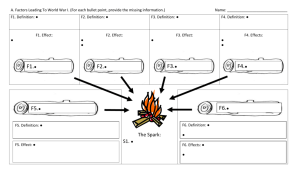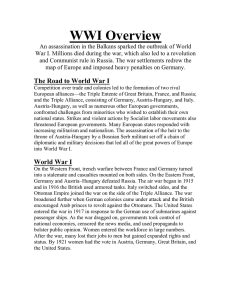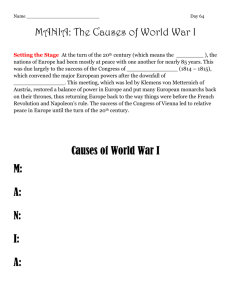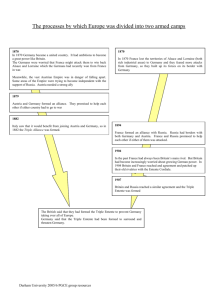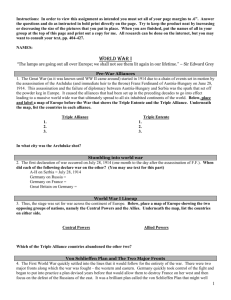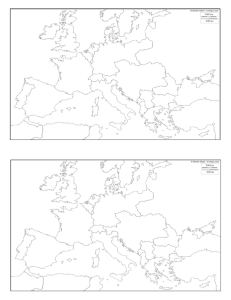WORLD WAR I
advertisement
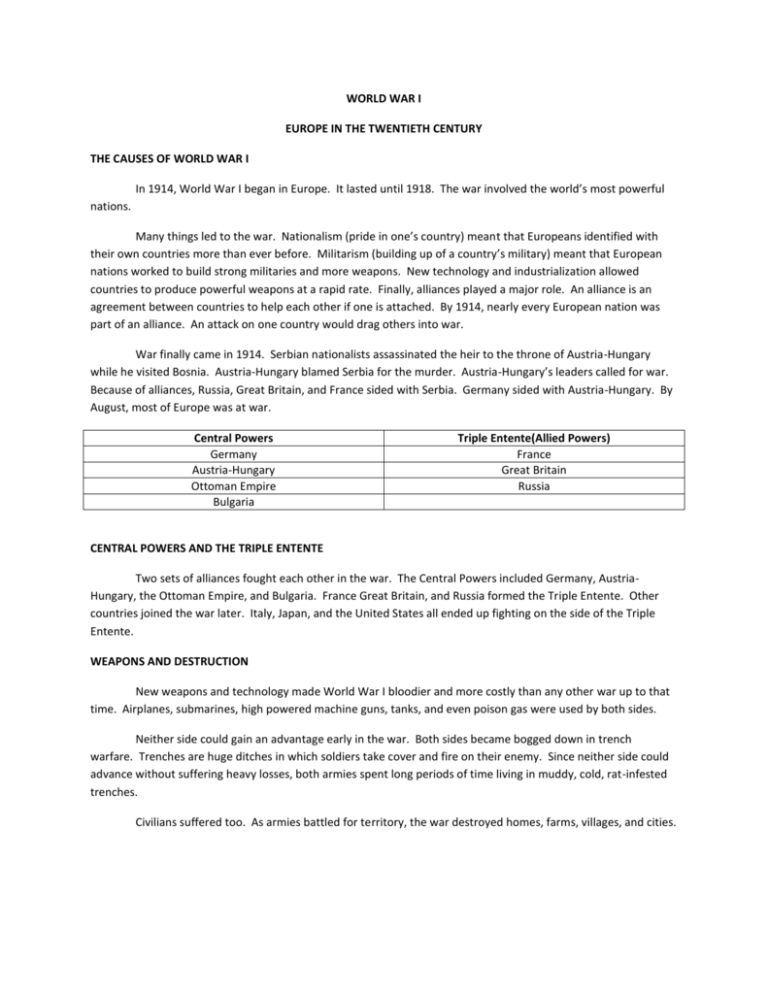
WORLD WAR I EUROPE IN THE TWENTIETH CENTURY THE CAUSES OF WORLD WAR I In 1914, World War I began in Europe. It lasted until 1918. The war involved the world’s most powerful nations. Many things led to the war. Nationalism (pride in one’s country) meant that Europeans identified with their own countries more than ever before. Militarism (building up of a country’s military) meant that European nations worked to build strong militaries and more weapons. New technology and industrialization allowed countries to produce powerful weapons at a rapid rate. Finally, alliances played a major role. An alliance is an agreement between countries to help each other if one is attached. By 1914, nearly every European nation was part of an alliance. An attack on one country would drag others into war. War finally came in 1914. Serbian nationalists assassinated the heir to the throne of Austria-Hungary while he visited Bosnia. Austria-Hungary blamed Serbia for the murder. Austria-Hungary’s leaders called for war. Because of alliances, Russia, Great Britain, and France sided with Serbia. Germany sided with Austria-Hungary. By August, most of Europe was at war. Central Powers Germany Austria-Hungary Ottoman Empire Bulgaria Triple Entente(Allied Powers) France Great Britain Russia CENTRAL POWERS AND THE TRIPLE ENTENTE Two sets of alliances fought each other in the war. The Central Powers included Germany, AustriaHungary, the Ottoman Empire, and Bulgaria. France Great Britain, and Russia formed the Triple Entente. Other countries joined the war later. Italy, Japan, and the United States all ended up fighting on the side of the Triple Entente. WEAPONS AND DESTRUCTION New weapons and technology made World War I bloodier and more costly than any other war up to that time. Airplanes, submarines, high powered machine guns, tanks, and even poison gas were used by both sides. Neither side could gain an advantage early in the war. Both sides became bogged down in trench warfare. Trenches are huge ditches in which soldiers take cover and fire on their enemy. Since neither side could advance without suffering heavy losses, both armies spent long periods of time living in muddy, cold, rat-infested trenches. Civilians suffered too. As armies battled for territory, the war destroyed homes, farms, villages, and cities. THE RUSSIAN REVOLUTION No country suffered from World War I more than Russia. Russia lacked modern industries and was less developed than Western Europe. Many Russians starved and froze to death while money, food, and resources went to support the war. Russian workers eventually revolted, and many soldiers joined them. Their uprising began the Russian Revolution. With no army to support him, Czar Nicholas II gave up his throne in 1917. A few months later, a group known as the Bolsheviks took over Russia. They formed a socialist state in hopes of establishing communism. Under true communism, people cooperate to meet each other’s needs. People share money, property, and resources. Governments are not necessary. The Bolsheviks based their communist ideas on the teachings of a man named Karl Marx. Marx taught that communism would result once common workers rose up to overthrow capitalism. A man named Vladimir Lenin led the Bolsheviks. In exchange for Germany’s support, Lenin promised to pull Russia out of the war once he was in power. Russia signed a peace agreement with Germany in 1918. Civil war went on in Russia for the next three years. In 1922, the Communist Party finally took unchallenged control of the government. They renamed Russia and the states under its control the Union of Soviet Socialist Republics (USSR). THE END AND AFTERMATH OF WWI World War I continued without Russia. With the addition of U.S trops and enemy tanks, Germany realized it could not win the war. The Germans agreed to sign an armistice ending the fighting in November 1918. The main powers signed a treaty officially ending the war. The Treaty of Versailles made Germany take full responsibility for the war. Germany had to pay reparations (money to cover the cost of the war). It also had to disarm its military. The harsh conditions wear meant to make sure that Germany could not start another war. EFFECTS OF EUROPEAN EMPIRE-BUILDING ON WWI Because many European nations still had colonies, soldiers from Africa and parts of Asia ended up fighting in World War I as well. Those who fought for the Triple Entente hoped to become independent nations once the war was over. Many of these people became bitter when victorious European nations decided not to grant independence to these territories. WORLDWIDE DEPRESSION World War I affected the European economy. Germany went broke trying to pay for the war. Europe’s war effort drained its colonies of resources. Even victors like Britain and France struggled. May nations had debts they could not pay. Returning soldiers needed jobs. Unemployment increased. Europe depended on economic help from the United States after World War I. In 1929, the United States stock market crashed. Many people lost everything. Banks and businesses closed. Around the world, unrest and nationalism grew. A worldwide economic depression resulted. People wanted strong leadership to make their countries rich and powerful again.
